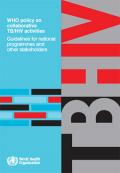Guidelines - Released in 2012
In 2004, the World Health Organization (WHO) published an interim policy on collaborative TB/HIV activities in response to demand from countries for immediate guidance on actions to decrease the dual burden of tuberculosis (TB) and human immunodeficiency virus (HIV).
These policy guidelines on collaborative TB/HIV activities are a compilation of existing WHO recommendations on HIV-related TB. They follow the same framework as the 2004 interim policy document, structuring the activities under three distinct objectives: establishing and strengthening mechanisms for integrated delivery of TB and HIV services; reducing the burden of TB among people living with HIV and initiating early antiretroviral therapy; and reducing the burden of HIV among people with presumptive TB (that is, people with signs and symptoms of TB or with suspected TB) and diagnosed TB.
The updated policy, in contrast to the 2004 policy, recommends offering routine HIV testing to patients with presumptive or diagnosed TB as well as to their partners and family members as a means of reducing the burden of HIV. TB patients who are found to be HIV-positive should be provided with co-trimoxazole preventive therapy (CPT).
Downloads
Organizations
- World Health Organization (WHO)






